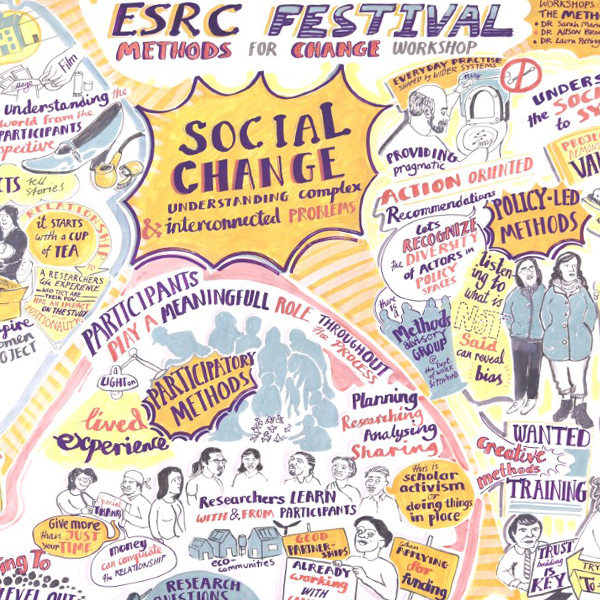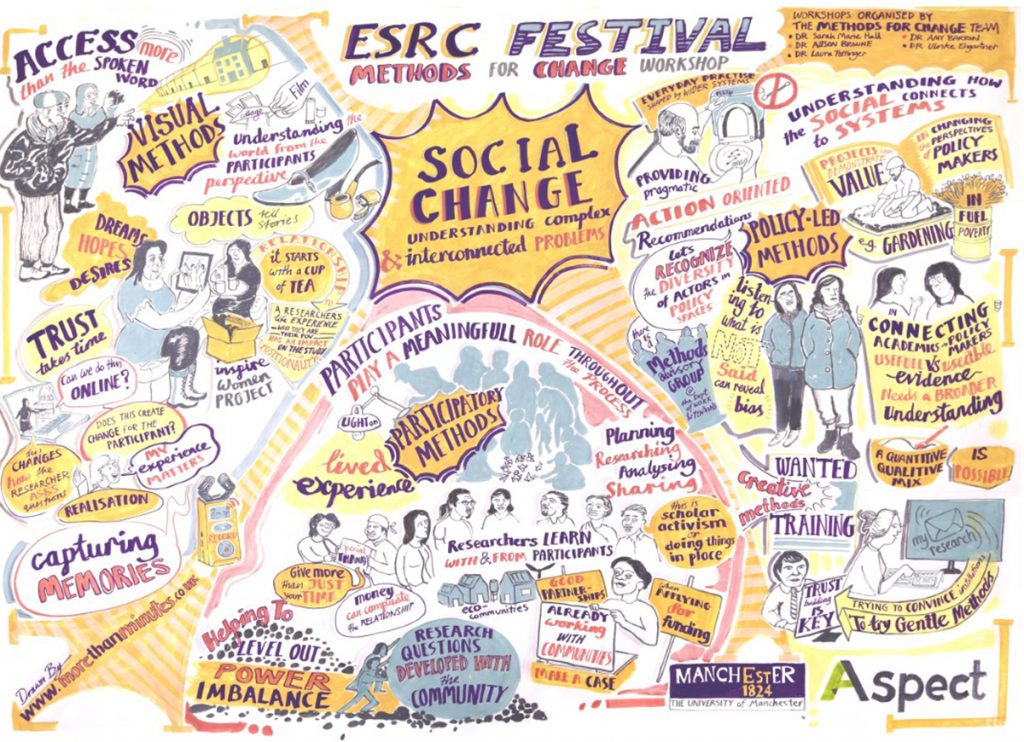As part of the ESRC Festival of Social Science 2020, the Methods for Change team hosted a series of online workshops focusing on the role of social science methods in tackling social and environmental challenges and creating positive change in diverse social contexts. Free to attend, three intimate and interactive sessions focused on visual, participatory and policy-led methods, each cultivating dialogue between academics as well as policy makers, government advisors, businesses, charities and NGOs including Natural England, WWF UK and Northumbrian Water. The events featured ten speakers, all contributors to the Methods for Change project, who will be showcasing their innovative methods in a variety of creative formats via the Aspect online platform in the coming months.
Visual and arts-based methods
The first session explored the transformative power of visual and arts-based methods. Dr Cheryl McGeachan, University of Glasgow, explained how geographical biographies were used in her research with an art collection called Art Extraordinary. Geographical biographies can be used to tell stories that are often unheard or unknown in a way that draws out the complex connections between objects, people and place. Dr Jen Owen, Cardiff University, showed how object-oriented interviews can be useful for understanding everyday life, drawing on her research on decluttering in self-storage units and people’s homes. This method can facilitate in-depth discussion about significant transitions in the lives of participants, such as bereavement or moving to a new house. Dr Amy Barron, University of Manchester, reflected on her use of photo go-alongs to foreground experience as it emerges through movement in her research with older people. Amy shared a collaboratively created photo and story collection which was used to open conversation between policy makers, academics and older people.
Lively discussion followed the presentations, involving interesting reflections from Inspire Women Oldham, a women-led capacity-building group based in Greater Manchester, who shared their experience of using creative, co-productive methods such as painting landscapes and making Christmas cards. The group were interested in exploring how arts-based methods might be helpful during Covid-19 restrictions in the UK to encourage women to leave the house, to engage with the world and recognise that their experiences matter. The discussion also touched on the need to recognise that artistic approaches are not an ‘add on’ to ‘make a project look pretty’ but are an important methodological tool in their own right. With arts-based approaches, fruitful insights often emerge through the ways a project spontaneously unfolds and in the process of doing and creating together. The discussion revealed that this process takes time, as it is important to build trusting relationships between researchers and research participants.
Participatory methods
Participatory methods have become increasingly popular both within and beyond the academy over the past decade. The second session examined the potential of participatory approaches for creating change through collaboration. Dr Kersty Hobson, Cardiff University, spoke about her application of business origami as a hands-on method to bring together diverse stakeholders to better understand and map large systems to help design-based product development and innovation. Dr Laura Pottinger, University of Manchester, shared her development and use of a gentle methodology in research with seed saving and gardening groups, and young people’s activism. Gentle approaches are slowly paced, embodied and emphasise sharing, and can shed light on practices of care, and subtle, mundane detail.
Participatory methods and scholar activism are appealing because they can disrupt established power relations and who is the ‘expert’ – participants are viewed as equal partners in the research who have expertise, and it is the researcher’s role to learn with them. By using participatory methods, the researcher can contribute towards the goals and priorities of the individuals, groups or organisations they are researching. Elaborating on this relationship, Prof. Jenny Pickerill, University of Sheffield, shared her use of participatory action research in eco-communities, showing how this method can help groups to meet their own objectives whilst uncovering complex issues such as race, gender or income.
Dr Megan Blake, University of Sheffield, spoke about coproduction methods for socially just and community driven change. This included an example of a workshop activity, drawn from research on community-based resilience building for a just food system, aimed at generating research questions with participants and building the capacity of the group involved. Throughout the session, discussions highlighted several challenges to using participatory approaches, including whether they can be scaled up or used in projects spread across multiple locations. It was suggested that ideally, participants should be involved in each step of the research process, and successful projects are often developed out of existing strong relationships where the researcher is already embedded within an organisation or community.
Policy-led methods
The third session explored how social change can be created or galvanised through policy-led methods. Dr Ulrike Ehgartner, University of Manchester, reflected on her use of sociological discourse analysis in the context of food sustainability and imagined futures of consumption. This method can be used to reveal how practices of communication are interconnected with practices of policy making and impact the scope of social change that is envisaged. Dr Alison Browne, University of Manchester, shared the transdisciplinary co-design toolkit Change Points, developed with colleagues from Universities of Manchester (Hoolohan), Sheffield (Watson, Sharp), Bristol (Evans) and Keele (Foden). Change Points enables diverse stakeholders to imagine how everyday practices are shaped by wider systems and assists in the design of change initiatives that address complex social and material relations that influence everyday life. Dr Ralitsa Hiteva, University of Sussex, shared insights into her research into fuel poverty in Sofia, Bulgaria. Speaking about researching and impacting policy in the context of the nexus of food, water and energy, she demonstrated the value of supplementing quantitative evidence-based data sources with visual, object-based and emotional accounts of what it means to experience hardship such as fuel poverty. Such examples make it easier for people such as policy makers to relate to various social groups.
Many practitioners appreciate creative methods training in order to gain the skills to reveal the lived experience of communities and structural limitation to change in nuanced ways, which can complement quantitative and statistical evidence. Further highlighted was the need to recognise the diversity of actors in policy spaces, which opens opportunities for more creative methods to be applied. The group also discussed possible avenues to develop long-term relationships between policy makers and researchers, and how established trust can support the introduction of more creative methods into the collaborative process.
Understanding the relationship between method and change: Next steps
Social scientists have developed an array of insightful and creative research methods to shine a light on social, cultural, ethical, environmental and legal issues that might otherwise be under-acknowledged or misunderstood. Social science research and methodologies can enhance quality of life and wellbeing and contribute to imagining alternative futures in critical and important ways. The Methods for Change team are working collaboratively to raise awareness of this richness and potential beyond academia.
Exploring the potential for social change to be generated throughout the research process is a central component of the Methods for Change project. The team are interested in better understanding how transformation can take place at different points in the research process and at a variety of scales. The project aims to clarify the relationships between methodologies, method, research design and social transformation, and has a particular focus on how methods themselves can elicit change. As such, it challenges the association of impact with results and outputs to reposition the doing of research as a space for change and transformation too. Approaching methods in this reflexive way can facilitate critical thinking about the purpose of social science methods and can broaden understandings of their potential.
The next stage of the project will see the Methods for Change team working with over 30 academics from across the Aspect network, learning about a fascinating range of different social science methods and approaches including life-mapping, oral histories, participatory interviews, social practice art as research and Ketso, to name a few. As we continue to forge meaningful and impactful connections across academia, charities, NGOs and businesses, each innovative and exciting method will be profiled and explained in an accessible written ‘how to’ guide and accompanying creative piece that communicates the value of each approach – watch this space!
Find out more about Methods for Change.





